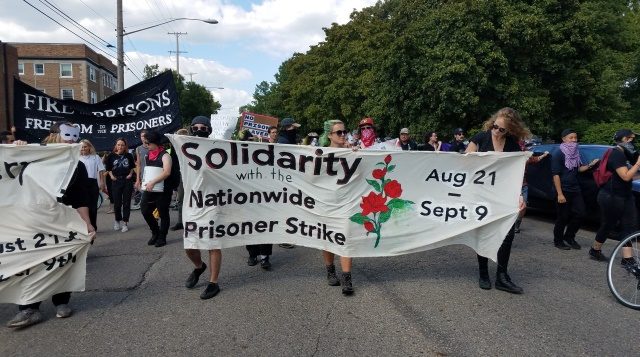
Marchers occupy Michigan Avenue in Lansing, MI to support the demands of prisoners striking across the U.S., Canada, and Palestine.
Immigrants in detention in Tacoma, Washington join strike
Heroic Sept. 9, 2016 strike at Michigan’s Kinross prison and retaliation against strikers publicized by march’s organizers
By Diane Bukowski
August 28, 2018
Lansing, MI – More than 100 people took the streets in Lansing Aug. 23 to support the national prisoner’s strike taking place from Aug. 21 to Sept. 9, called by a coalition of prisoners and their organizations. The march began with a rally in Durant Park and blocked Michigan Avenue for miles afterwards, proceeding past City Hall, where speakers addressed the crowd, and then to the Michigan Department of Corrections headquarters, where organizers posted placards supporting the prison strike on its doors.
Michigan Avenue rang with chants of “No Mass Incarceration, We Don’t Want a Prison Nation,” “Fire to the Prisons, Free all the Prisoners,” and “Brick by Brick, Wall by Wall, We Will Make the Prisons Fall,” as drums and noisemakers sounded. Drivers of many cars honked their horns in solidarity, although they were temporarily blocked by the march.
Video above: Alejo Stark, a PhD candidate at U-M, and spokesperson for Michigan Abolition and Prison Solidarity summarizes goals of rally.
Stark added in a release, “We want a world in which prisons do not act as catch-all solutions to our society’s problems, a society that perpetuates violence with more violence–by putting people in cages. Prisoners are going to keep rebelling against confinement, so we can’t help but ask, ‘Can we imagine a society without prisons? Michigan spends just over $2 billion dollars on the MDOC. Imagine what we could do with that money in a state where Flint still does not have clean water and Detroit is closing down schools to the students.”
Since 2004, Detroit has virtually demolished its entire public education system, once considered world-class and high-achieving. The majority of youth in Detroit now attend non-accountable charter schools, many of them for-profit. Most have inferior curriculae, not including music, band, athletics, social workers, libraries, and many other programs that made the schools unifying anchors for communities.
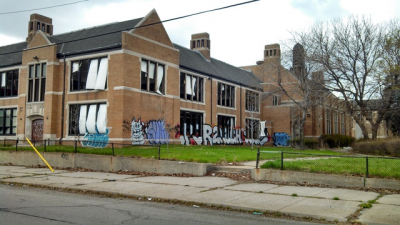
Southwestern High School, now closed and devastated, as are many other once proud public schools in Detroit.
Long-term prisoners in the MDOC have noted a new influx of young prisoners, a product of the “School-to-Prison-Pipeline.”
The devastation of education for Detroit’s majority-Black youth has created despair, involvement in crime to support families, and killings throughout the city’s neighborhoods tied to the drug trade and a lack of direction for the youth.
Dennis Boatwright spent 24 years in the Michigan prison system and now devotes his time to raising public awareness and organizing to abolish the prison system, a demand that many young people raised after the historic Attica Rebellion in September, 1971. Then, they chanted, “Tear Down the Walls,” and “Prisons are Concentration Camps for the Poor.” The Attica Rebellion gave birth to other uprisings in prisons across the country, and a new consciousness about a country that has five percent of the world’s population, but 25 percent of its incarcerated population.
Dennis Boatwright spent 24 years in the Michigan prison system and now devotes his time to raising public awareness and organizing to abolish the prison system, a demand that many young people raised after the historic Attica Rebellion in September, 1971. Then, they chanted, “Tear Down the Walls,” and “Prisons are Concentration Camps for the Poor.” The Attica Rebellion gave birth to other uprisings in prisons across the country, and a new consciousness about a country that has five percent of the world’s population, but 25 percent of its incarcerated population, at least 70 percent of whom are Black and Latino. They are treated worse than animals.
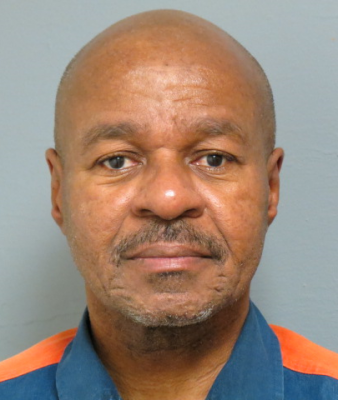
Ricardo Ferrell, 60, in prison since 1982.
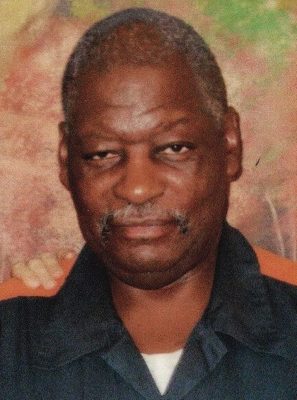
Charles Lewis, 59, in prison since 1976.
MDOC prisoner Ricardo Ferrell quoted Kate Cox of the Osborne National and Burden Association in a recent article addressing the aging population of prisoners in the U.S.
“At its most basic, hard time is profoundly hard on the body,” Cox wrote. “Incarceration makes existing medical issues worse and increases the risk of developing new ones. It leads to a process of ‘accelerated aging’—which is a gentle way of saying that inmates’ physiological age begins to outpace their chronological age, sometimes by as much as ten or fifteen years, such that 50 year-olds seem more like 60- and 65-year olds, and 70-year-olds seem as old as 85.”
Charles Lewis, 59, who has been wrongfully incarcerated for 42 years in the MDOC, frequently lists the names of men he has befriended who died far earlier than expected due to the horrible medical care and food that Michigan prisoners receive. He himself developed severe diabetes after going to prison at the age of 17, has had three heart attacks, and suffers from numerous other ailments.
As a long-time prison activist herself, and now editor of the Voice of Detroit, Diane Bukowski also addressed the rally to call attention to the plight of Michigan’s 247 “juvenile lifers.” They continue to be incarcerated despite the fact that the U.S. Supreme Court ruled in Miller v. Alabama (2012) and Montgomery v. Louisiana (2016) outlawed the practice of sending children ages 17 and under to die in prison. The Michigan Supreme Court recently contravened the highest court in the U.S., claiming that judges who are re-sentencing these men and women, many of whom have spent decades in prison, do not have to specify factually whether they are the “rarest” child incapable of rehabilitation.
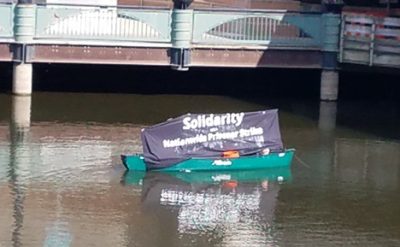
Boat with huge banner declaring “Solidarity with the National Prisoners Strike” on Grand River in Lansing
“In 1955, the U.S. Supreme Court outlawed segregation in southern schools in Brown v. the Board of Education,” she noted. “When the states refused to comply, federal troops were sent to force them to obey the law of the land. We need federal troops to free our juvenile lifers.”
Organizers also recalled the historic rebellion at Michigan’s Kinross Correctional Facility on Sept. 9, 2016, during which hundreds of prisoners rose up against bestial conditions and treatment. The radio broadcast below contains reports from Kinross prisoners of those events, and the severe retaliation meted out to them afterward. Another source said at least three Kinross organizers died in the aftermath; the cause of death is not known.
For more information on the organizers of this march, go to:
https://www.facebook.com/michiganabolition/
PRISONERS NOW STRIKING IN AT LEAST 11 STATES
IMMIGRANTS IN WASHINGTON DETENTION CENTER JOIN NATIONAL PRISON STRIKE
Aug 28, 2018, 5:14pm Tina Vasquez
Re-Wire News
Prisoners at Hyde Correctional Facility, N.C. join nation-wide action
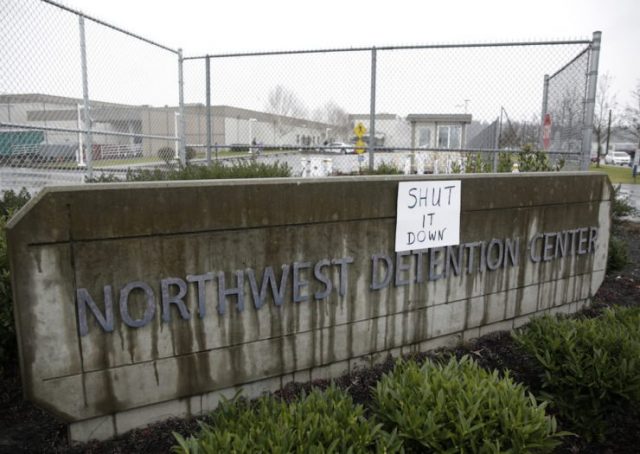
Immigrants detained in the Tacoma, Washington Northwest Detention Center have joined the national strike, whose leaders also call for the abolition of I.C.E.
In a handwritten letter shared on the NWDC Resistance Facebook page, immigrants participating in the hunger strike said they were “demanding change and closure of these detention centers.”
“We are acting with solidarity for all those people who are being detained wrongfully and stand together to help support all those women who have been separated from their children, and to stop all the family separations happening today for a lot of us are also being separated and we have U.S. citizen children,” immigrants participating in the hunger strike said in a handwritten letter shared on the NWDC Resistance Facebook page.
One week into the national prison strike, a movement led by incarcerated people demanding an end to “prison slavery” and improvements that recognize their humanity, immigrants in detention have launched a strike of their own in solidarity.
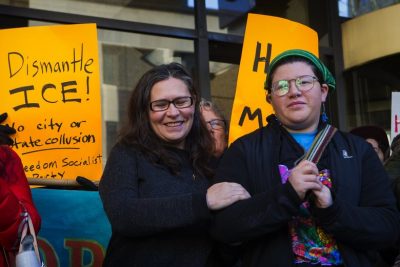 Newsweek first reported on Thursday that an estimated 60 immigrants detained by Immigration and Customs Enforcement (ICE) at the Northwest Detention Center (NWDC) in Tacoma, Washington, are participating in a hunger strike. In a statement to Newsweek, ICE initially denied the hunger strike was taking place. On Tuesday afternoon, in an emailed statement to Rewire.News, the agency confirmed that six people detained at NWDC are currently participating in a hunger strike.
Newsweek first reported on Thursday that an estimated 60 immigrants detained by Immigration and Customs Enforcement (ICE) at the Northwest Detention Center (NWDC) in Tacoma, Washington, are participating in a hunger strike. In a statement to Newsweek, ICE initially denied the hunger strike was taking place. On Tuesday afternoon, in an emailed statement to Rewire.News, the agency confirmed that six people detained at NWDC are currently participating in a hunger strike.
“Rumors of a widespread hunger strike are false,” the agency said.
This morning, Maru Mora Villalpando, a spokesperson for the undocumented-led immigrant rights group, NWDC Resistance, told Rewire.News the number of immigrants participating in the strike is fluctuating. She said that she could confirm six hunger strikers at NWDC had been placed in solitary confinement by ICE and that the strike may spread to Oregon and California.
“People are getting moved to different pods, people are being sent to solitary; it’s hard to track. We thought it officially launched on Tuesday, but we’ve now heard that some may have begun striking on Monday,” Mora Villalpando said in a phone call. “I spoke to a hunger striker last night and he told me that the medical unit is full, and so is the solitary unit and that he is one of six people in medical isolation. They could be full because people are being transferred there for retaliation or because people are getting sick from not eating or drinking because of the strike. Of course that is concerning because of the poor medical care they will receive. We want to make it clear that we are not the ones organizing this strike. That is the last thing we would do. This is being led by people in the facility. They are already tortured in there, we would never tell them not to eat or drink.”
In a handwritten letter shared on the NWDC Resistance Facebook page, immigrants participating in the hunger strike said they were “demanding change and closure of these detention centers.”
“We are acting with solidarity for all those people who are being detained wrongfully and stand together to help support all those women who have been separated from their children, and to stop all the family separations happening today for a lot of us are also being separated and we have U.S. citizen children,” the letter reads.
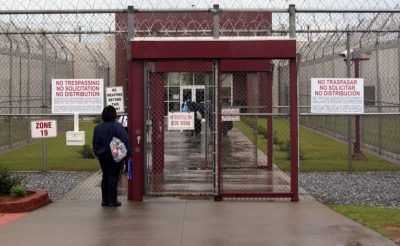
Stewart Detention Center in Lumpkin, GA/AP photo
Women in detention have told Mora Villalpando that they too would like to participate in the hunger strike, but she said, ICE has told them that if they hunger strike, they will be moved to a different facility, away from their children. ICE has a history of transferring hunger strikers to other facilities.
The prison strike, launched by prisoners in SouthCarolina in response to
the riot in the state’s Lee Correctional Institution in which seven prisoners lost their lives, began August 21, on the anniversary of the death of incarcerated activist George Jackson. “Jackson, a member of the Black Panther Party, was a leading voice and theorist in the 1970s prison movement—a time that saw hundreds of uprisings behind bars. On April 24, prisoners in South Carolina announced the strike, which is expected to last for 19 days and ends on the anniversary of the Attica prison uprising in New York,” Raven Rakia reported in the Nation,
 In April 2018, Project South filed a lawsuit against the nation’s largest private prison company, CoreCivic, on behalf of Shoaib Ahmed and other immigrants detained at the Stewart Detention Center in Lumpkin, Georgia. The lawsuit alleges that the company “violates human trafficking laws and employs a deprivation scheme to force immigrants detained at Stewart to work for sub-minimum wages, and then threatens to punish them for refusing to work through solitary confinement or loss of access to necessities.” In 2014, the law firm Outten & Golden filed a similar lawsuit against the nation’s second largest private prison company, GEO Group, for engaging in similar practices at the Aurora Detention Center in Colorado, in violation the Trafficking Victims Protection Act.
In April 2018, Project South filed a lawsuit against the nation’s largest private prison company, CoreCivic, on behalf of Shoaib Ahmed and other immigrants detained at the Stewart Detention Center in Lumpkin, Georgia. The lawsuit alleges that the company “violates human trafficking laws and employs a deprivation scheme to force immigrants detained at Stewart to work for sub-minimum wages, and then threatens to punish them for refusing to work through solitary confinement or loss of access to necessities.” In 2014, the law firm Outten & Golden filed a similar lawsuit against the nation’s second largest private prison company, GEO Group, for engaging in similar practices at the Aurora Detention Center in Colorado, in violation the Trafficking Victims Protection Act.
Both U.S. citizens in prisons and immigrants in detention centers are detained in facilities run by private prison companies, and they are subjected to similar conditions. Much like the immigrant detention system, which has become synonymous with human rights abuses and in-custody deaths, advocates have called the nation’s private prison system a “national disgrace,” synonymous with “violence, abuse, and death.”
“The huge strike is about solidarity, but a lot of the people in detention also came from prisons. After they served their sentence or got parole, they were immediately transferred to ICE custody. They were never really free,” Mora Villalpando told Rewire.News. “I’m not joking when I say that these people who have known both kinds of facilities actually say that prison is ‘better.’ By that I mean we all know prison is horrible, but in prison you have some sense of when you will get out or there is equation programs. Sometimes you get contact visits. That’s not how it works in detention centers, so these people truly understand the prison strike. Those who have not been in a prison still want to participate in the [hunger] strike because no matter what GEO says about NWDC, it is a prison.”
Currently, Mora Villalpando and other organizers with NWDC Resistance are in search of legal representation for the hunger strikers in solitary confinement, one of whom says ICE told him that if he does not eat, he will be force-fed. While ICE has previously denied it retaliates against detainees, there are documented cases of the agency moving to force-feed hunger strikers. As Rewire.News reported in December 2015, detainees at the Etowah County Detention Center in Gadsden, Alabama, ended a 14-day hunger strike after hearing that a district judge authorized officials to force-feed one of the hunger strikers at Etowah.

An enslaved African is depicted being force-fed.
“The idea that immigrants are being threatened with force-feeding in the United States is so wild to me, but it also isn’t. We have a history of this. This happened during slavery,” said Kevin Steel. Steel, an organizer with the Incarcerated Workers Organizing Committee, which is led by formerly incarcerated people, is referring to the ways enslaved people were force-fed if they attempted to stop eating.
“When I think of what they’re risking to be in solidarity with us, that touches me. As a Black man, as someone who was in prison, that is important to me. I stand with them, and I’m glad they’re standing with us in this fight.”
Steel, who was incarcerated in New York and still remembers seeing men put their feet in toilets because their cells were so hot during summer days and the facility had no fans or air conditioning, said he understands why prisoners are striking.
“It’s about basic human decency,” Steel told Rewire.News. “It’s about not having access to basic human stuff, like cool air and food that isn’t raw and disgusting.”
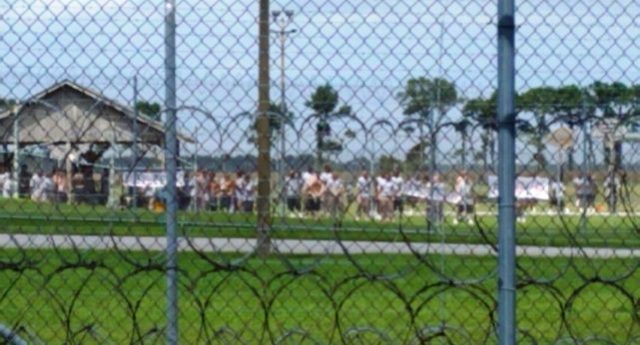
Over 100 prisoners rally on the Hyde Correctional Facility, N.C. yard while holding up banners featuring demands. Banners read, “Parole,” “Better Food,” and “In Solidarity.”
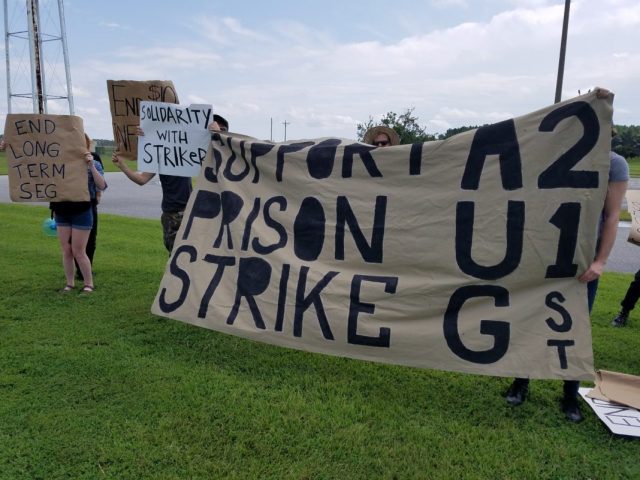
Protesters outside Hyde support prisoners there.
Related from the New York Times
https://www.nytimes.com/2018/08/30/opinion/national-prison-strike-slavery-.html
https://www.nytimes.com/2018/08/26/us/national-prison-strike-2018.html




